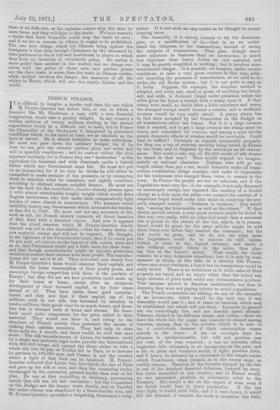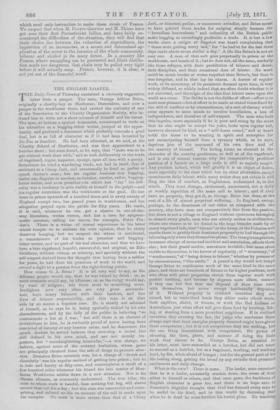FRENCH FINANCE.
IT is difficult to imagine a harder task than the one which M. Pouyer-Quertier has before him, or one in which a financier like Mr. Gladstone, a man with a true financial imagination, would take a greater delight. In any country a sudden addition of twenty millions sterling to the annual expenditure would be a difficult call to meet, but in France the Chancellor of the Exchequer is hampered by precedent conditions which, to his mind at least, are as absolute as the laws of nature. He is almost forbidden to make reductions. He must not pare down the military budget, for if he
does he can give the country neither glory nor order, and will be speedily overthrown ; and he cannot reduce the civil expenses suddenly, for in France they use " destitution " as the equivalent for dismissal, and wide dismissals excite a hatred before which any Government must fall. He must not put on an income-tax, for if he does he thinks he will either be compelled to make enemies of the peasants, or by exempting them to sanction what he considers, and rightly considers, according to abstract reason, socialist finance. He must not tax the land, for the contribution, foncib.e already presses upon it with almost unendurable weight, weight which would drive English landowners, who fret under their comparatively light burden of rates, almost to insurrection. The peasants would infallibly destroy any Government which increased this burden, as they did in 1848. He must not tax any necessary of life, such as salt, for French history connects all direct taxation of that kind with a detested re'gime. And now it appears that the grand resource which M. Pouyer-Quertier fondly fancied was left is also unavailable,—that his heavy duties on raw material cannot and will not be imposed. He thought, in the lightness of his Protectionist heart, that if he could put 20 per cent, ad valorem on the import of Bilk, cotton, wool, and so on, that Frenchmen would pay a little more for their dress ; and that though manufacturers might be injured, protection would soon restore their content with their profits. The manufac- turers did not see it at all. They perceived very clearly how M. Pouyer-Quertier's taxes would consume their capitals, and diminish the home consumption of their pretty goods, and encourage foreign competition with them in the markets of Europe ; but they did not see how protection could make up for their losses at home, except after an enormous development of their invested capital, or for their losses abroad at all. They have elates, these good manufac- turers, and they saw that if their capital, say of ten millions, sunk in raw silk, was increased by taxation to twelve millions, their goods must be so much dearer, and there- fore less in demand both at home and abroad. No draw- back could quite compensate for the price added to their material. They would not have it, and owing to the structure of French society they possessed the means of making their opinion executive. They had only to close their mills for a month, and there would be civil war once more. The silk manufacturers of Lyons, for instance, could by a single and perfectly legal order provide the International with 200,000 troops, and compel the State either to take a whole city into its pay, as Troehu did in Paris, or to increase its garrison to 100,000 men, and France is not the country where a fight of that kind can be localized. M. Pouyer- Quertier reflected that Lyons was two-thirds the size of Paris and gave up the silk at once, and then the remaining trades, encouraged by the concession, pressed harder than ever on his plan. Ile was at first unyielding to obstinacy, announcing openly that silk was his last concession ; but the Committee on the Budget saw the danger more clearly, and on Tuesday the entire scheme was abandoned by a three-fourths vote, and M. Pouyer-Quertier, mortified or despairing, threatened a reeig- nation. It is not such an easy matter as he thought to invent drawing taxes. The Assembly, it is stated, intends to try the American plan, or a modification of it,—that is, as we under- stand the telegram, to tax transactions, instead of taxing the subjects of transactions. That plan, though much more injurious to business than an income-tax, is much less injurious than heavy duties on raw material, and i it may be greatly simplified n working ; but it involves some considerable danger. It is possible, we imagine, under certain conditions to raise a very great revenue in this way, with- out impeding the processes of manufacture, as we used to do- under our old Excise system ; but it is not quite so easy as it looks. Suppose, for example, the simplest method is adopted, and every sale, small or great, of anything but bread, salt, and milk, is declared illegal under penalties, unless the seller gives the buyor a receipt with a stamp upon it. If that stamp were small, no doubt after a little resistance and worry the stamped receipt would become a custom, and a moderate revenue would be very easily raised. A penny stamp has in fact been accepted by the Committee on the Budget on all transactions above ten francs. But it is a large revenue that is wanted, and to get a large revenue the stamp must be heavy, and calculated ad valorem, and among a most thrifty' people desperate efforts at evasion would be inevitable. Could they be baffled ? Certainly as regards immovable property, for they are, a tax of extreme severity being levied, in France by the State, and in England by the attorneys on all convey- ances. But could a sale, say, of £1,000 worth of silk dresses be taxed in that way ? That would depend, we imagine, mainly on national character. Italians, who will go any length rather than pay a tax, would instantly make all trans- actions confidential, forego receipts, and make it impossible for the tradesman who charged them twice to remain in the town. In France the people are not so coherent, and if the Legislature went very far—if, for example, it not only disowned an unstamped receipt, but imposed the making of a double charge as a duty upon the seller—we suspect the caution of a suspicious buyer would make him insist on receiving the pro- perly stamped receipt. " Business is business," they would say, "among the honourable, as well as the others." If that theory proved correct, a very great revenue might be levied in that way very easily, with no other bad result than a universal rise in prices to the extent of the tax, which, be it remem- bered, would be great, for the same articles might be sold three times over before they reached the consumer ; but the• risk would be great, and we do not see what more the Legislature could do to enforce its will, unless, indeed, it went to the logical extreme, and made sa sale without receipt felony in the seller, thus plao- ing him at the buyer's mercy. That would, for social reasons, be a very desperate expedient; but it is only by some measure as strong as this that, in a country like France, where men count centimes, a heavy tax on transactions could be easily levied. There is no unfairness in it while sales of fixed property are taxed, and no injury other than the injury any large increase of price must under any circumstances produce. That increase proved in America unendurable, but then in America they were not paying tribute to avoid requisitions.
The French economists are talking, we see, of the necessity of an income-tax, which would be the best tax, if any Assembly would pass it ; and of taxes on luxuries, which may be established, but which will not draw. Luxuries in general. use are exceedingly few, and are heavily taxed already. Tobacco, alcohol in its different forms, and coffee,—there we have the whole list, for sugar can scarcely be classed among luxuries, among, that is, the articles which it is safe to, tax a ,nisericorde, because if their consumption ceases. nobody is the worse. A tax on carriages kept for pleasuie is unobjectionable, but will not produce one per cont. of the sum required ; a tax on servants, often suggested, falls ultimately as an income-tax on the poor, and a tax on plate and furniture would, if light, produce little, and if heavy, be defeated by a recurrence to the simple habits which Frenchmen, when pressed, as in the recent siege, so readily resume. Taxation of the luxuries enjoyed by the few is one of the hundred financial delusions fostered by envy, has never succeeded in any country, and in France would, we are persuaded, produce no substantial relief to the Treasury. Nor would a tax on the export of wine, even if the South would bear it, prove productive. If the tax were light, it would yield little, and if it were heavy, it would kill the demand, or transfer the trade to countries like Italy,
which need only instruction to make them rivals of France. We suspect that when M. Pouyer-Quertier and M. There have got over their first Protectionist follies, and have fairly en- countered the difficulties of the situation, they will find that their choice lies between the reduction of expenditure, the imposition of an income-tax, or a severe and determined ap- plication of the screw to the luxuries of the whole community, tobacco and alcohol in its many forms. In a country like France, where smuggling can be prevented and illicit distilla- tion made too dangerous, that chain may be pulled very tight before it will actually snap. France, however, it is clear, is not yet out of the financial wood.































 Previous page
Previous page